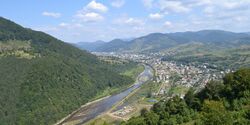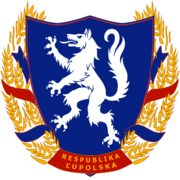Luepola
This article is incomplete because it is pending further input from participants, or it is a work-in-progress by one author. Please comment on this article's talk page to share your input, comments and questions. Note: To contribute to this article, you may need to seek help from the author(s) of this page. |
Republic of Luepola Respublika Ľupolska | |
|---|---|
| Motto: Narod i Sloboda Naviek Nation and Freedom Forever | |
| Anthem: Marš Pobiede Victory March | |
Location of Luepola | |
| Capital | Prishek |
| Largest city | Voitz |
| Official languages | Luepolan |
| Recognised regional languages | |
| Ethnic groups (2018) | Luepolan Molves 82% Non-Luepolan Molves 12% Vierz 4% Other 2% |
| Religion | Tiberianism |
| Demonym(s) | Luepolan |
| Government | Federal semi-presidential republic |
• President | Savo Grigorević |
• Vice President | Milan Konstantiňević |
• Prime Minister | Sabina Škupovna |
| Legislature | Sliet |
| Great Assembly Veliki Sbor | |
| Popular Assembly Ľudovi Sbor | |
| Establishment | |
• Unification of Varadna and Strentland | 4 August 1329 |
| 10 July 1390 | |
| 22 November 1951 | |
| Area | |
• Total | [convert: invalid number] |
| Population | |
• 2019 estimate | 49,295,271 |
• Density | 134.6/km2 (348.6/sq mi) |
| GDP (PPP) | 2019 estimate |
• Total | $1.158 trillion |
• Per capita | $23,497.76 |
| GDP (nominal) | 2019 estimate |
• Total | $972 billion |
• Per capita | $19,738.12 |
| Gini | 33.1 medium |
| HDI | 0.842 very high |
| Currency | Luepolan Grivna (Ғ) (LG) |
| Time zone | UTC+1 |
| Date format | dd.mm.yyyy |
| Driving side | right |
| Calling code | +52 |
| Internet TLD | .lu |
Luepola (/luˈpoʊlə/, Luepolan: Ľupola [ʎuˈpɔla] or [juˈpɔla]), officially the Republic of Luepola (Respublika Ľupolska [resˈpublika ʎuˈpɔlska]), is a sovereign state located in central Erisia. It is divided into fifteen voblasts and two federal municipalities. Luepola's capital is Prishek, and its largest city is Voitz.
Etymology
The name "Luepola" (Vierz: Lüpolen) is a borrowing of the Luepolan endonym Ľupola, wherein the initial palatalized /ʎu/ was realized as /lʏ/. This name in turn derives from the contracted form of the Proto-Molvic *ľubъ and poľe, which translate to "pleasant" and "field". These words would have been spoken together as *ľuby poľe, "pleasant fields", to describe the lands on which the early Molves lived. The grammatically simplified phrase *ľubъ poľà was contracted to a single word and the ъ later deleted, yielding *ľubpoľà. The earliest attestation of Luepola's name appears in this form as Любъполꙗ, with the ъ still written. At this stage of development, the term was appropriated by Luka the Great as the new name of the recently unified kingdom of Varadna-Strentland. The final ľ was later depalatalized, rendering the modern name Ľupola (until 1906, written as as Люпола).
The exonym "Strentland" had been applied to the kingdom ruling Bosunija by the Veisic world, and is used to this day in Savic and Vierz to refer to Luepola, albeit as an archaic form in the latter. This form is derived from the Old East Vierz compound strāza-enti-lant, translating to "the land where the roads end". This name was applied by Veisic tribes to the whole south Erisian coast, but eventually was adopted as an exonym for the coastal Molvic kingdom nearest to the Veisic peoples.
History
Prehistory
Molvic Tribal Era
Kingdoms of Varadna and Strentland
Unification of Varadna and Strentland; Kingdom of Luepola (1329-1818)
First Luepolan Republic (1818-1905)
People's Republic of Luepola (1905-1948)
Second Republic of Luepola (1951-Present)
Geography

Climate
Biodiversity
Demographics
Population
Ethnic Groups
Languages
Religion
Health
Education
Urbanization
| Largest cities of Luepola (2019 census) | |||||||||
|---|---|---|---|---|---|---|---|---|---|
| City | Population | State | City | Population | State | ||||
| 1 | Voitz | 2,364,964 | Občina Vojc | 11 | Bráznica | 595,788 | Aneska | ||
| 2 | Rostva | 1,512,376 | Jutska | 12 | Elenevo | 581,393 | Jutska | ||
| 3 | Prishek | 948,083 | Hautbecirk | 13 | Čakajec | 560,848 | Bružka | ||
| 4 | Zvin | 713,555 | Varadna | 14 | Aneska | 557,854 | Aneska | ||
| 5 | Grast | 704,721 | Trnava | 15 | Voľana | 547,967 | Varadna | ||
| 6 | Kořevac | 687,397 | Trnava | 16 | Nediňe | 539,901 | Bosunija | ||
| 7 | Bosaňe | 664,919 | Dvolăn | 17 | Mlaževo | 500,608 | Varadna | ||
| 8 | Hrdovna | 655,083 | Sevierna | 18 | Đalan | 488,226 | Nimorăn | ||
| 9 | Utrna | 644,323 | Bosunija | 19 | Judusa | 472,475 | Bosunija | ||
| 10 | Pomorna | 638,575 | Jutska | 20 | Obránse | 470,273 | Cărnipoře | ||
Politics
Constitution of Luepola
Government and the Sliet
Law Enforcement
Foreign Relations
Military
Culture
Art
Literature
Music
Television and Cinema
Sport
Cuisine






